Robbie Robertson, The Band's lead guitarist and primary songwriter, dies at 80
Robbie Robertson, guitarist and main songwriter for The Band died Wednesday at age 80. The Toronto-born musician penned classics such as "The Weight" and "The Night They Drove Old Dixie Down."
Robertson and Garth Hudson had been the two surviving members of The Band, which gained acclaim on their own after backing up first Ronnie Hawkins and then Bob Dylan in the '60s. The Band was inducted into the Rock and Roll Hall of Fame in 1994.
Robertson, who recently completed the soundtrack to the film "Killers of the Flower Moon," died in Los Angeles, surrounded by family, “after a long illness,” his publicist Ray Costa said in a statement.
The Band was made up of Arkansan drummer-singer Levon Helm and three other Canadians: bassist-singer-songwriter Rick Danko, keyboardist singer-songwriter Richard Manuel and Hudson, who played keyboards and other instruments including saxophone.
Together they influenced popular music and genres such as alt-country and Americana. They were originally called the Hawks, but adopted the name of The Band, because they were usually referred to as the "the band" backing others such as Dylan and Hawkins, according to American Songwriter magazine.
Remembering those we lost: Celebrity Deaths 2023
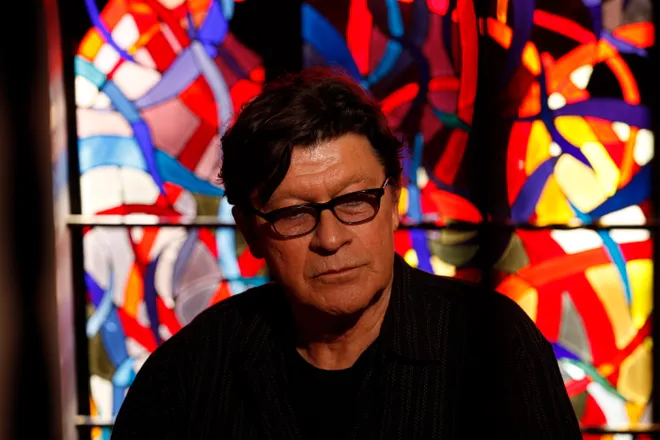
Robbie Robertson's early years
He was born Jaime Royal Robertson in Toronto on July 5, 1943, part-Mohawk and Cayuga (Native American people of New York state) and part Jewish. He never met his biological father. He spent his summers on the Six Nations of the Grand River reserve, where his mother grew up.
When Robertson was 15, his group opened for Hawkins at a club in Toronto. After he overheard Hawkins tell his band he needed some new songs, Robertson wrote two that night – “Someone Like You,” and “Hey Boba Lu” – and the next morning gave them to Hawkins, who recorded both. Soon after that Robertson joined Hawkins' band, which already included Levon Helm.
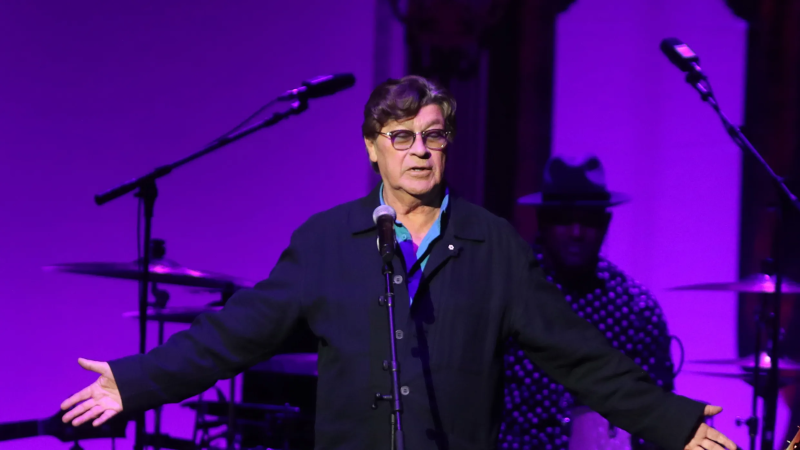
The Band and its legacy: With Bob Dylan and afterward
Robertson and the others split from Hawkins and in 1965 agreed to support Bob Dylan on his U.S. tour and on the 1966 world tour, which included the May 1966 show in England, during which a fan screamed out “Judas!" in response to Dylan's embrace of electric music.
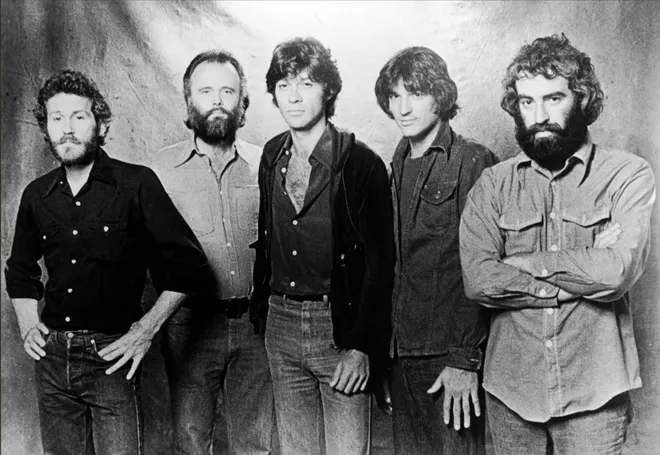
Later in 1966, Dylan had his infamous motorcycle accident and was recuperating in the Woodstock area, where The Band also soon settled. They began working on what became "The Basement Tapes" album that included songs such as “Tears of Rage” and “I Shall Be Released." The album was released in 1975 and a full six-CD release came in 2014.
Dylan encouraged The Band to create its own album and the first two albums, “Music from Big Pink” and “The Band,” both released in the late 1960s, are classics. “Music from Big Pink” featured Robertson's "The Weight." The follow-up album, "The Band," released in 1969, included several Robertson compositions including "The Night They Drove Old Dixie Down" and "Up On Cripple Creek."
In his 2016 memoir, "Testimony," Robertson recalled playing "Music from Big Pink” to Dylan. “After each song, Bob looked at ‘his’ band with proud eyes. When ‘The Weight’ came on, he said, ‘This is fantastic. Who wrote that song?’ ‘Me,’ I answered. He shook his head, slapped me on the arm, and said, ‘Damn! You wrote that song?’"
Robertson and The Band: Woodstock to 'The Last Waltz'
The Band played at the 1969 Woodstock festival, not far from where they lived, and became newsworthy enough to appear on the cover of Time magazine. After more than a decade together, Robertson organized a sendoff for The Band: The Last Waltz.
The all-star gathering at San Francisco’s Winterland Ballroom included Dylan, Van Morrison, Neil Young, Muddy Waters and many others and was filmed by Martin Scorsese for his documentary “The Last Waltz,” released in 1978.
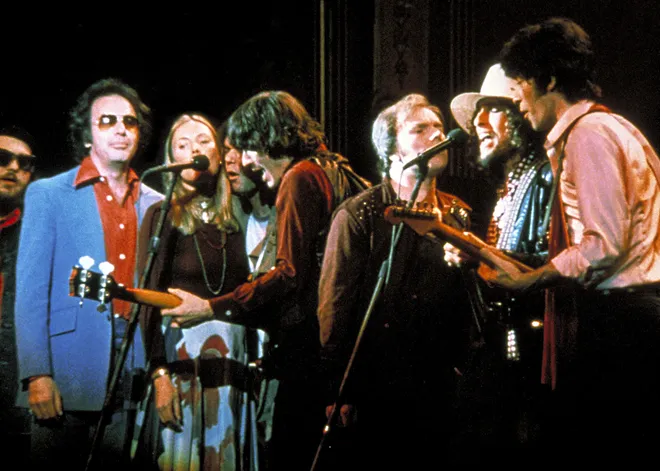
After "The Last Waltz," Robertson and Helm's relationship severed. In his 1993 memoir “Wheel on Fire,” Helm accused of Robertson of greed and outsized ego, noting that Robertson had ended up owning their musical catalog. Robertson contended that he had taken control of the group because the others – excepting Hudson – were too burdened by drug and alcohol problems to make decisions on their own.
Robertson began a successful career creating soundtracks for Scorsese's films including “The Color of Money,” “The King of Comedy,” “The Departed” and “The Irishman." Scorsese would serve as an executive producer on the 2020 documentary “Once Were Brothers," about The Band's history.
In addition to producing some other artists including Neil Diamond's 1976 album “Beautiful Noise,” Robertson had a vibrant solo career. His first solo album "Robbie Robertson," released in 1987, went gold and included guest artists such as Bono, Peter Gabriel, Maria McKee and fellow Band members Garth Hudson and Rick Danko. Later albums “Music for the Native Americans” and “Contact from the Underworld of Redboy” explored his heritage.
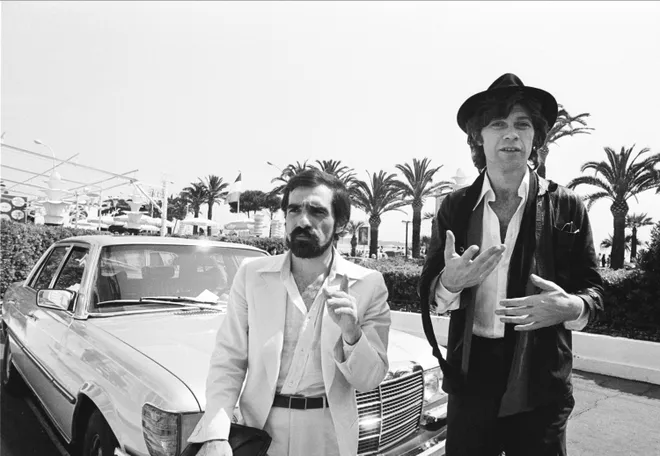
The influence of The Band, which was inducted into the Rock and Roll Hall of Fame in 1994, has spread throughout the decades – from The Grateful Dead to Drive-By Truckers and Wilco – with artists such as Aretha Franklin, Joan Baez, and the Staple Singers having covered their songs.
In a 2020 interview with Dan Rather, Robertson said The Band took all of its influences "and we put it all in this big pot, stirred it up and when we put it out and people were like, what's that? And I said what that is, that's people that have woodshedded and gathered and honed their skills, all in the name of music," he said. "This has nothing to do with wanting to be a pop star. This has to do with a depth of a musicality and all of the guys in the band were on that wavelength. And that's how come we were able to do that together."
Contributing: The Associated Press
Disclaimer: The copyright of this article belongs to the original author. Reposting this article is solely for the purpose of information dissemination and does not constitute any investment advice. If there is any infringement, please contact us immediately. We will make corrections or deletions as necessary. Thank you.







